What are the Best Remedies for Hair Regrowth?
It may come as a surprise, but hair loss affects nearly 50% of the population in the United States. This widespread issue can have a significant impact on one’s self-confidence and overall well-being. However, the good news is that there are numerous effective remedies available to combat hair fall and promote healthy hair regrowth. In this comprehensive Guide, we’ll explore the best solutions to restore your luscious locks and revitalize your scalp.
Key Takeaways
- Understand the common causes of hair loss and their impact on mental health
- Discover the benefits of natural remedies like essential oils, aloe vera, and onion juice
- Learn about the role of nutrition and specific vitamins and minerals for hair growth
- Explore herbal treatments and scalp care techniques to stimulate hair regrowth
- Incorporate lifestyle changes and professional treatments for optimal hair health
Understanding Hair Loss: Causes and Effects
Experiencing hair loss can be a challenging and often distressing situation. To tackle this issue effectively, it’s crucial to understand the common causes of hair thinning, the impact on mental health, and how to recognize different hair loss types. By gaining a deeper understanding, individuals can take proactive steps to reduce thinning hair, combat baldness, and Treat alopecia.
Common Causes of Hair Loss
Hair Loss can be attributed to a variety of factors, including genetic predisposition, hormonal imbalances, medical conditions, and certain lifestyle choices. Genetic factors, such as androgenetic Alopecia, can lead to a gradual thinning of hair over time. Hormonal changes, particularly during pregnancy, menopause, or due to thyroid disorders, can also contribute to hair shedding. Additionally, medical conditions like anemia, autoimmune disorders, and certain medications can disrupt the natural hair growth cycle.
Impact on Mental Health
The psychological impact of hair loss should not be underestimated. Thinning hair or bald patches can significantly affect an individual’s self-esteem, confidence, and overall well-being. The loss of hair can lead to feelings of anxiety, depression, and social withdrawal, as people may feel self-conscious about their appearance. Addressing the emotional and mental aspects of hair loss is crucial for promoting overall health and well-being.
Recognizing Your Hair Loss Type
Identifying the specific type of hair loss is the first step towards finding effective solutions. Common types of hair loss include:
- Androgenetic Alopecia (male/female pattern baldness)
- Telogen effluvium (sudden, temporary hair shedding)
- Alopecia areata (autoimmune-related hair loss in patches)
- Traction alopecia (hair loss due to excessive tension or pulling)
Understanding the underlying cause of hair loss can Guide the appropriate treatment approach and help individuals take targeted action to reduce thinning, combat baldness, and Treat alopecia.
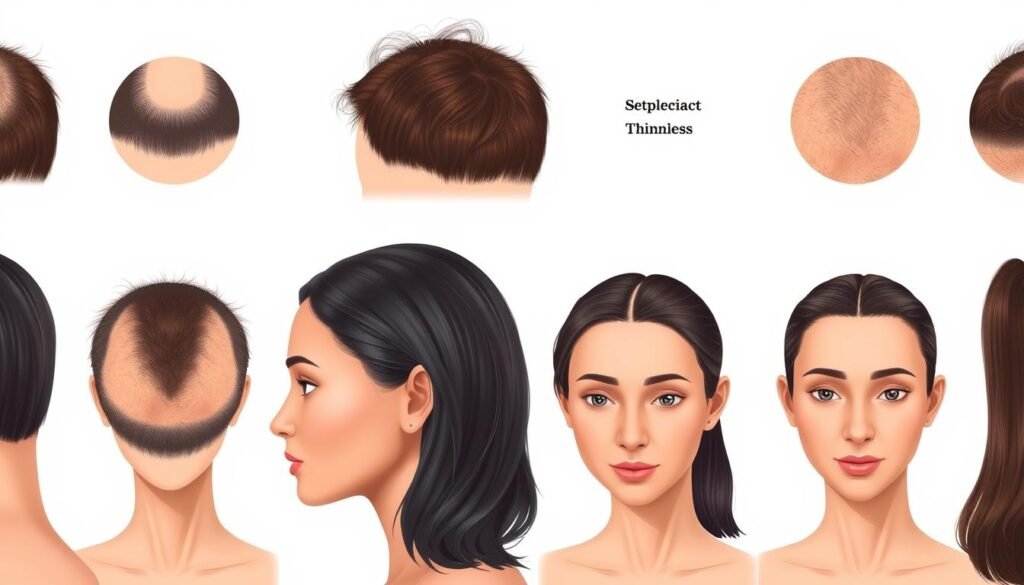
| Hair Loss Type | Characteristics | Potential Causes |
|---|---|---|
| Androgenetic Alopecia | Gradual thinning and receding hairline, often in a specific pattern | Genetic factors, hormonal imbalances |
| Telogen Effluvium | Sudden, excessive shedding of hair | Stress, illness, medication, hormonal changes |
| Alopecia Areata | Round, patchy hair loss | Autoimmune disorder |
| Traction Alopecia | Hair loss due to tension or pulling on the hair | Hairstyles that put strain on the scalp |
By understanding the underlying causes and effects of hair loss, individuals can take proactive steps to address the issue and work towards restoring healthy, vibrant hair.
Natural Remedies for Hair Regrowth
When it comes to anti-hair fall remedies and promoting healthy hair growth, natural solutions can be incredibly effective. Let’s explore some of the best natural remedies that can help stop shedding and revitalize your locks.
A Look at Essential Oils
Essential oils like rosemary and peppermint have shown promising results in stimulating hair follicles and improving blood circulation to the scalp. Rosemary oil is believed to inhibit the production of DHT, a hormone that can lead to hair loss, while peppermint oil may increase the number of hair follicles and promote thicker, fuller hair.
Benefits of Aloe Vera
Aloe vera is a versatile plant with numerous benefits for hair health. Its soothing properties can help soothe an irritated scalp, while the enzymes and vitamins in aloe vera can nourish and strengthen the hair. Applying fresh aloe vera gel directly to the scalp can be an excellent anti-hair fall remedy.
How Onion Juice Can Help
- Onion juice is rich in sulfur, which is essential for the production of collagen and the growth of new hair cells.
- The antimicrobial properties of onion juice can help reduce scalp inflammation and prevent further hair shedding.
- Regularly massaging onion juice into the scalp may stimulate blood circulation and promote healthy hair growth.
Incorporating these natural remedies into your hair care routine can be a powerful way to combat hair loss and encourage hair regrowth. Remember to be patient and consistent, as it may take some time to see the full benefits.
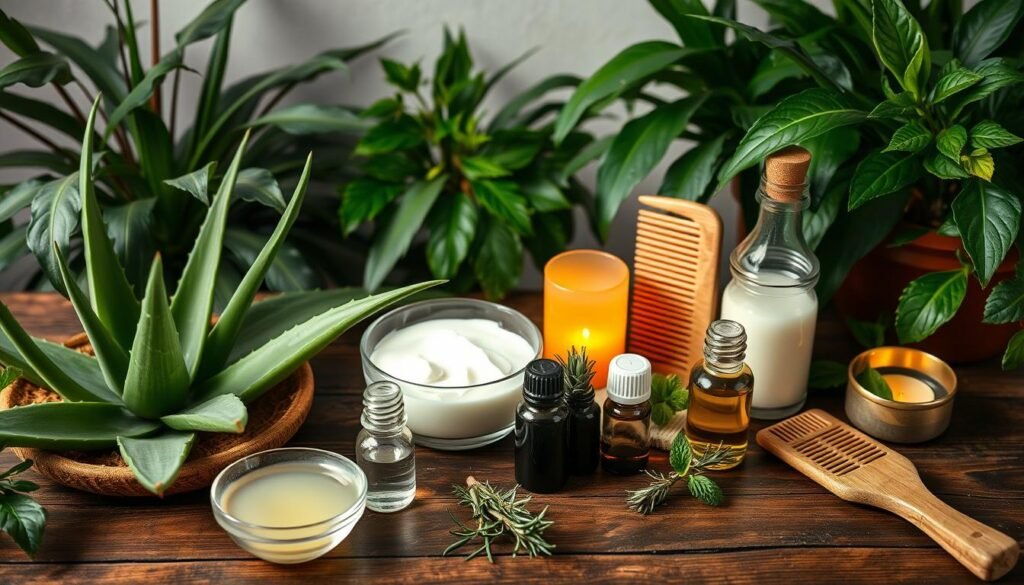
Nutritional Support for Healthy Hair
Maintaining healthy, vibrant hair goes beyond external treatments – the key lies in nourishing your body from within. Vitamins, minerals, and essential nutrients play a vital role in promoting hair growth, reducing thinning, and restoring the natural lustre of your locks.
Vitamins and Minerals for Hair Growth
To stimulate healthy hair growth, look for supplements and foods rich in the following key vitamins and minerals:
- Biotin (vitamin B7) helps strengthen hair and nails, preventing breakage and shedding.
- Iron supports the oxygen-carrying capacity of your blood, which is crucial for healthy follicle function.
- Zinc contributes to cell division and protein synthesis, aiding in the production of new hair strands.
- Vitamin C boosts collagen production, which strengthens the hair’s structure.
- Vitamin E acts as an antioxidant, protecting hair follicles from damage and premature aging.
The Role of Protein
Protein is the building block of hair, making up about 95% of its composition. Ensuring adequate protein intake is essential for maintaining strong, resilient hair that is less prone to thinning and breakage. Incorporate lean meats, eggs, fish, legumes, and nuts into your diet to provide your hair with the necessary structural support.
Foods to Include in Your Diet
| Food | Nutrient | Benefits for Hair |
|---|---|---|
| Spinach | Iron, Vitamin C | Supports hair growth and prevents thinning |
| Salmon | Protein, Omega-3s | Nourishes hair follicles and reduces inflammation |
| Avocado | Biotin, Vitamin E | Strengthens hair and promotes shine |
| Sweet Potatoes | Vitamin A | Supports sebum production for healthy scalp |
| Nuts and Seeds | Zinc, Selenium | prevent hair loss and encourage growth |
By incorporating these hair-friendly nutrients into your daily diet, you can provide your locks with the essential nourishment they need to thrive and look their best. Remember, a well-balanced, nutrient-rich diet is the foundation for healthy, vibrant hair growth.

Herbal Treatments to Consider
In the quest to combat hair loss and promote regrowth, herbal remedies have gained significant attention. From the ancient uses of fenugreek seeds to the emerging popularity of saw palmetto, these natural solutions offer a promising approach to address various causes of hair fall.
Fenugreek Seeds: The Natural Booster
Fenugreek, a common ingredient in many Indian dishes, has been used for centuries to nourish and strengthen hair. These small, brown seeds are rich in proteins, vitamins, and minerals that can stimulate hair follicles, prevent anti-hair fall remedies, and promote healthy growth. By incorporating fenugreek into your hair care routine, you can harness its natural hair loss prevention properties and combat baldness effectively.
Saw Palmetto: What You Should Know
Saw palmetto, a plant native to the southeastern United States, has gained recognition for its potential in addressing male pattern baldness. This herbal supplement is believed to inhibit the production of dihydrotestosterone (DHT), a hormone that can contribute to anti-hair fall remedies and hair thinning. By regulating DHT levels, saw palmetto may assist in hair loss prevention and support healthy hair growth, making it a compelling option for those seeking anti-hair fall remedies.
Green Tea: Benefits Beyond Drinking
While green tea is well-known for its numerous health benefits when consumed, it also holds promise for hair care. The antioxidants present in green tea, such as epigallocatechin gallate (EGCG), can help nourish the scalp and promote hair loss prevention. Additionally, the anti-inflammatory properties of green tea may aid in combating baldness by reducing scalp inflammation, which can contribute to hair loss.
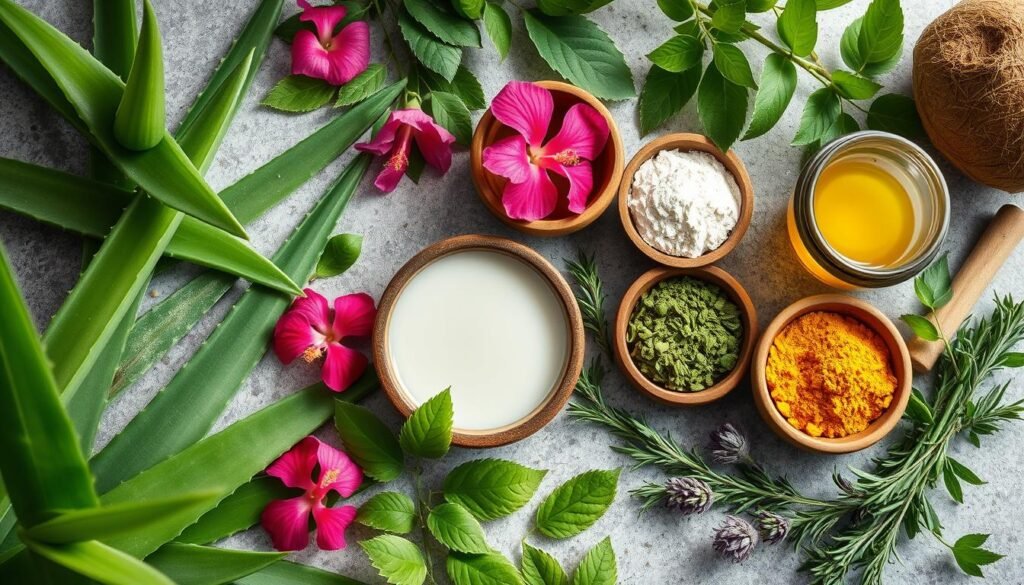
Incorporating these herbal treatments into your hair care regimen can provide a natural and holistic approach to addressing hair loss concerns. By harnessing the power of fenugreek, saw palmetto, and green tea, you can take proactive steps towards achieving healthier, anti-hair fall remedies and hair loss prevention.
Scalp Care: The Foundation of Hair Growth
Achieving healthy, vibrant hair starts with a well-cared-for scalp. Your scalp is the foundation for hair growth, and neglecting its needs can lead to issues like excessive shedding, thinning, and even hair loss. In this section, we’ll explore the importance of scalp care, including effective exfoliation techniques, scalp massage methods, and tips for choosing the right shampoo to support your scalp care routine and promote healthy hair growth.
Importance of Scalp Exfoliation
Regular scalp exfoliation is crucial for maintaining a healthy, balanced environment for your hair. Exfoliating helps remove built-up dirt, oil, and dead skin cells that can clog hair follicles and inhibit hair growth. By keeping your scalp clean and clear, you can encourage the growth of strong, healthy hair and stop shedding.
- Reveals fresh, rejuvenated skin on the scalp
- Improves blood circulation to encourage hair growth
- Prevents the accumulation of product residue and sebum
- Reduces the risk of scalp irritation and inflammation
Massaging Techniques for Hair Growth
In addition to exfoliation, regular scalp massage can be a powerful tool for promoting healthy hair growth. Gentle, circular motions help increase blood flow to the scalp, delivering essential nutrients to the hair follicles and stimulating the production of new hair cells.
- Use your fingertips to apply light, circular pressure all over the scalp
- Focus on areas where you experience thinning or shedding
- Incorporate essential oils, like rosemary or peppermint, to enhance the benefits
- Massage for 5-10 minutes, 2-3 times per week, for optimal results
Choosing the Right Shampoo
The shampoo you use can have a significant impact on the health of your scalp and, by extension, your hair. Look for shampoos that are formulated with nourishing ingredients like aloe vera, tea tree oil, or biotin to cleanse your scalp without stripping it of its natural oils.
“The right shampoo can make all the difference in maintaining a healthy, balanced scalp environment for optimal hair growth.”
Avoid harsh, sulfate-based shampoos, as they can disrupt the scalp’s natural pH and lead to dryness, irritation, and even exacerbate hair loss. Instead, opt for gentle, sulfate-free formulas that will gently cleanse your scalp without compromising its delicate balance.
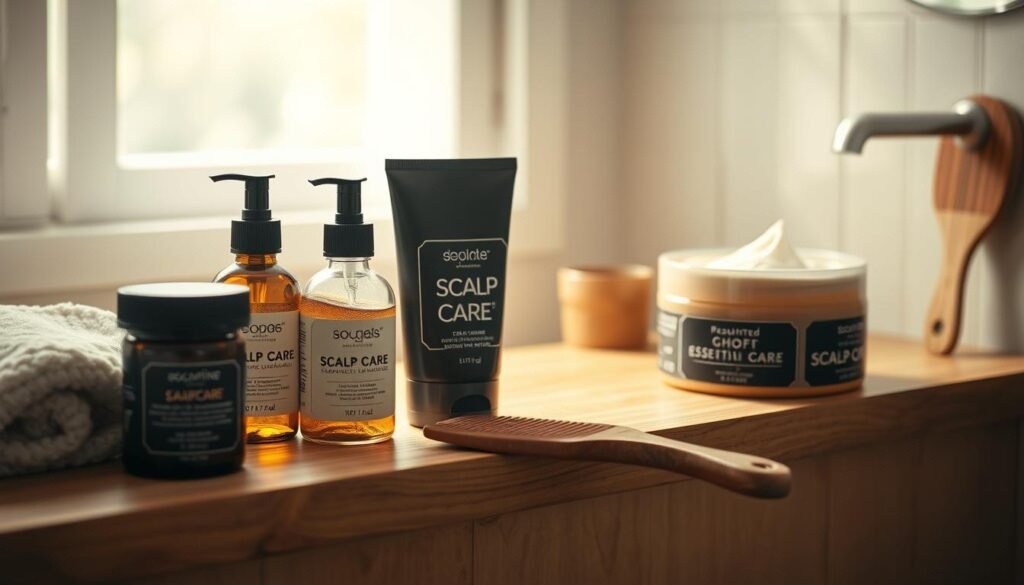
Lifestyle Changes for Better Hair Health
Achieving healthy, vibrant hair often goes beyond topical treatments. By making simple lifestyle adjustments, you can support your hair’s natural growth cycle and prevent issues like reduce thinning hair and hair loss prevention. Let’s explore some proven techniques to promote healthy hair growth.
Stress Management Techniques
Chronic stress can take a significant toll on your hair, leading to increased shedding and impaired follicle function. Incorporate stress-relieving practices into your routine, such as meditation, yoga, or deep breathing exercises. These activities can help lower cortisol levels and create a more nurturing environment for your hair to thrive.
The Importance of Sleep
Quality sleep plays a crucial role in hair health. During sleep, your body undergoes important restorative processes, including the production of growth hormones that support hair follicle activity. Aim for 7-9 hours of uninterrupted sleep each night to optimize your hair’s growth potential.
Avoiding Over-styling and Heat Damage
- Limit the use of hot styling tools like blow dryers, curling irons, and straighteners, as excessive heat can cause severe damage to the hair shaft and follicles.
- Opt for gentle, low-heat styling methods whenever possible, and always apply a heat-protective product before using hot tools.
- Allow your hair to air-dry whenever feasible, and be mindful of the frequency and duration of heat-based styling sessions.
By making these lifestyle adjustments, you can create an environment conducive to reduce thinning hair, hair loss prevention, and healthy hair growth. Remember, consistency and patience are key when it comes to achieving lasting improvements in hair health.

Professional Treatments for Hair Regrowth
When natural remedies and lifestyle changes are not enough to combat hair loss, professional treatments can offer a more effective solution. From cutting-edge therapies to FDA-approved medications, these advanced options can help treat alopecia and promote healthier, thicker hair growth.
PRP Therapy: What to Expect
Platelet-Rich Plasma (PRP) therapy is a revolutionary treatment that harnesses the power of your own blood to stimulate hair regrowth. This non-invasive procedure involves extracting a small amount of blood, which is then spun in a centrifuge to separate the nutrient-rich platelets. These concentrated platelets are then injected back into the scalp, delivering a potent boost of growth factors to combat baldness and treat alopecia.
Laser Therapy: Pros and Cons
Low-level laser therapy (LLLT) is another professional treatment that can help treat hair loss and promote regrowth. This non-invasive technique uses low-intensity laser light to stimulate the scalp and increase blood circulation, which in turn can combat baldness and improve hair density. While laser therapy is generally considered safe and effective, it’s important to weigh the pros and cons and consult with a professional to determine if it’s the right choice for your hair loss situation.
How Medication Can Aid Recovery
In addition to professional therapies, FDA-approved medications can also play a crucial role in hair loss prevention and regrowth. Minoxidil, a topical solution, has been shown to effectively stimulate hair follicles and promote new hair growth, while finasteride, a oral medication, can block the conversion of testosterone to DHT, a primary contributor to male pattern baldness. When used as directed, these medications can help combat baldness and treat alopecia, providing a valuable complement to other hair loss treatments.
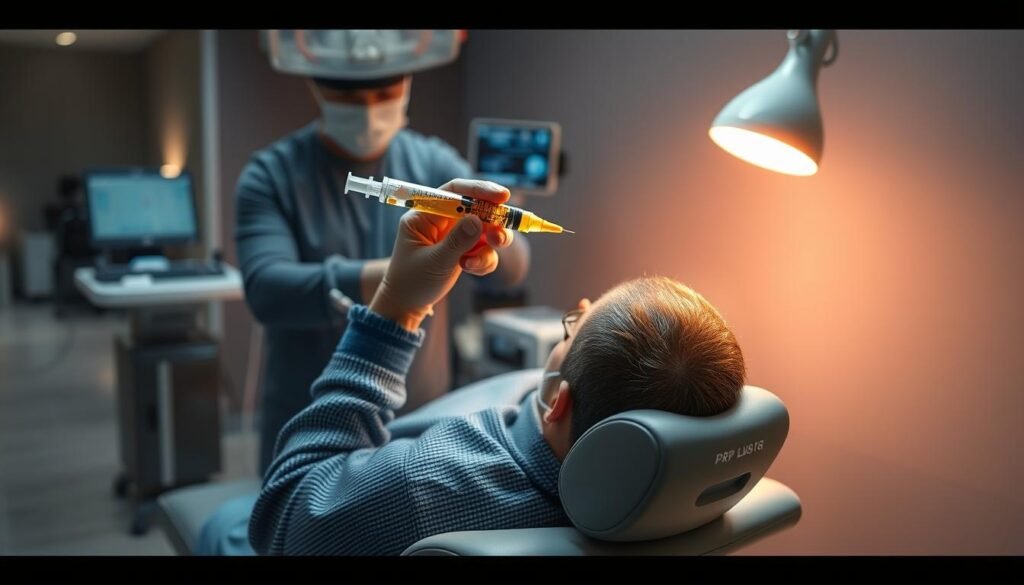
DIY Hair Masks for Regrowth
When it comes to promoting healthy hair growth and preventing hair fall, DIY hair masks can be a game-changer. These nourishing treatments, made with natural ingredients, can help revitalize your scalp and stimulate new hair growth. Let’s explore some easy-to-make recipes and learn how to incorporate them into your hair care routine.
Recipes for Nourishing Hair Masks
One of the most effective DIY hair masks for regrowth is a blend of anti-hair fall remedies like castor oil, coconut oil, and fenugreek seeds. Simply combine these ingredients, warm them gently, and massage the mixture into your scalp. This potent concoction can help stop shedding and promote healthy hair growth.
Another nourishing option is an avocado and honey mask. Mash a ripe avocado and mix it with a tablespoon of raw honey. Apply this rich, creamy mixture to your hair and scalp, allowing it to deeply condition and rejuvenate your tresses.
How Often to Use Them
- For best results, use a DIY hair mask 1-2 times per week.
- If your hair is particularly dry or damaged, you can increase the frequency to 2-3 times per week.
- Consistency is key, so make it a habit to incorporate these masks into your regular hair care routine.
Tips for Application
- Start by thoroughly cleansing your hair to ensure the mask can penetrate effectively.
- Apply the mask from root to tip, focusing on your scalp and the ends of your hair.
- Cover your hair with a shower cap or towel and let the mask sit for 20-30 minutes before rinsing.
- Follow up with a gentle, sulfate-free shampoo to remove any residue.
Incorporating these nourishing DIY hair masks into your hair care regimen can be a simple, yet powerful way to support anti-hair fall remedies, promote healthy hair growth, and stop shedding. Be patient, consistent, and enjoy the journey towards healthier, more vibrant locks.

The Role of Genetics in Hair Loss
When it comes to hair loss, genetics play a significant role. Hereditary patterns and genetic predisposition can significantly influence the likelihood of experiencing combat baldness, treat alopecia, and other forms of hair loss prevention. Understanding the genetic factors behind hair loss is crucial for developing effective strategies to maintain healthy hair.
Understanding Hereditary Hair Loss
Hair loss is often a hereditary condition, passed down through generations. Certain genetic markers and hormonal factors can make individuals more susceptible to androgenetic alopecia, the most common type of hair loss. This pattern of gradual thinning and receding hairline is known as “male-pattern baldness” or “female-pattern baldness,” depending on the individual’s gender.
Can You Fight Genetic Predisposition?
- While genetics play a significant role in hair loss, there are steps you can take to mitigate the impact of your genetic predisposition.
- Adopting a holistic approach to hair care, including the use of natural remedies, can help promote healthier hair growth and combat the effects of hereditary hair loss.
- Regular scalp care, a balanced diet, and stress management techniques can all contribute to maintaining a healthy head of hair, even in the face of genetic challenges.
Importance of Early Intervention
If you are aware of a family history of hair loss, it is crucial to be proactive and seek early intervention. Addressing the issue in its early stages can increase the chances of successful hair loss prevention and hair regrowth. Consulting with a dermatologist or trichologist can help you develop a personalized plan to manage your genetic predisposition and maintain a healthy, vibrant head of hair.

“Understanding the role of genetics in hair loss is the first step towards taking control of your hair health. With the right approach and early intervention, you can combat the effects of hereditary hair loss.”
Misconceptions About Hair Growth
When it comes to hair growth and hair loss prevention, there are many misconceptions that can lead to ineffective or even harmful practices. Let’s take a closer look at some of the most common myths and provide the scientific facts to help you make informed decisions about your hair care routine.
Debunking Common Myths
One of the persistent myths is that frequent haircuts will stimulate faster hair growth. The truth is, haircuts only remove the dead, split ends of the hair, and they do not directly impact the rate of new hair growth from the scalp. The speed of hair growth is primarily determined by your genetic factors and overall health.
Another common misconception is that using hot styling tools, such as blow dryers or straighteners, can damage the hair and lead to thinning. While excessive heat exposure can cause dryness and breakage, moderate and careful use of these tools does not directly cause permanent hair loss.
Clarifying Misunderstood Treatments
Many people believe that shaving the head will cause the hair to grow back thicker. This is not the case. Shaving the hair only affects the thickness and texture of the individual strands, not the overall density or growth rate of the hair.
Some individuals also believe that using harsh, chemical-laden hair products can stimulate hair growth. In reality, these products can actually contribute to hair damage and even hair loss by stripping the scalp of its natural oils and causing irritation.
The Science Behind Hair Regrowth
The key to healthy hair growth lies in understanding the science behind the hair growth cycle. Hair follicles go through various stages, including growth, resting, and shedding. Factors such as genetics, hormones, and overall health can all influence the health and growth of your hair.
To encourage hair loss prevention and healthy hair growth, it’s essential to focus on scalp health, provide the necessary nutrients, and address any underlying medical conditions that may be contributing to thinning hair.
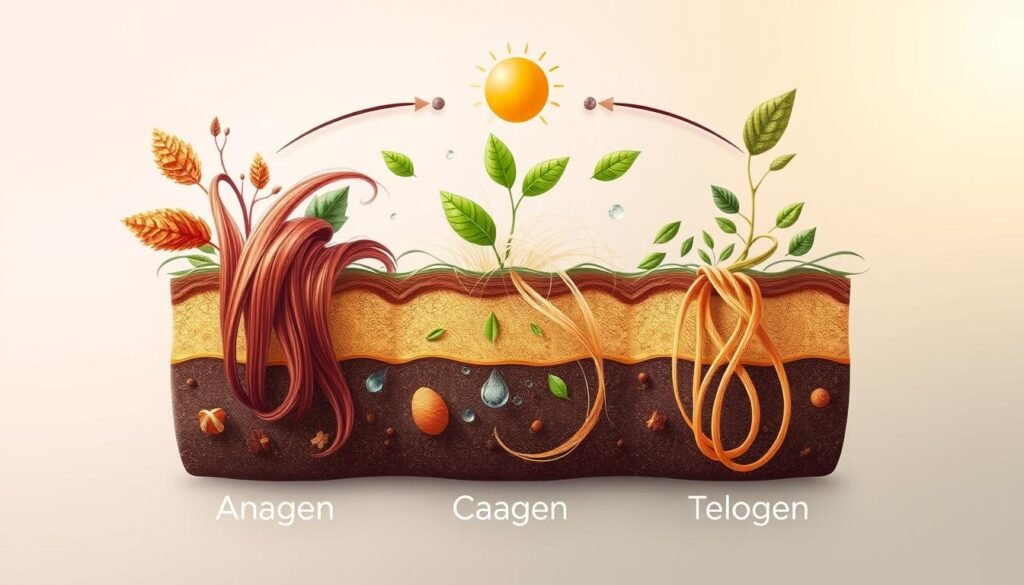
By understanding the science behind hair growth and debunking common misconceptions, you can develop a more informed and effective hair care routine to achieve the luscious, healthy locks you desire.
Building a Hair Care Routine
Achieving healthy, vibrant hair requires a comprehensive approach that incorporates daily practices, natural remedies, and professional guidance. Crafting an effective scalp care routine is the foundation for promoting healthy hair growth and preventing hair fall.
Daily Practices for Healthier Hair
Start your day with a gentle scalp massage using your fingertips. This simple ritual stimulates blood circulation and helps nourish the hair follicles. Pair it with a nourishing anti-hair fall shampoo to cleanse your scalp and locks without stripping them of their natural oils.
Don’t forget to protect your hair from heat damage by limiting the use of styling tools and opting for air-drying whenever possible. Additionally, be mindful of your sleeping habits, as proper rest is crucial for overall hair health.
Incorporating Natural Remedies
- Incorporate essential oils, such as rosemary or peppermint, into your scalp care routine to stimulate hair growth and soothe the scalp.
- Apply a weekly hair mask infused with nourishing ingredients like coconut oil or aloe vera to deeply condition your hair and promote healthy hair growth.
- Try using a natural hair fall serum containing ingredients like saw palmetto or fenugreek to address the root cause of your hair loss.
When to Seek Professional Help
If you’ve been diligently following a scalp care routine and incorporating anti-hair fall remedies, but still experience persistent hair loss or thinning, it’s wise to consult a dermatologist or trichologist. They can help identify the underlying causes and recommend personalized treatments to address your specific hair health needs.

“Building a comprehensive hair care routine is the key to achieving the luscious, healthy locks you’ve always desired.”
Conclusion: Embrace Your Journey to Healthy Hair
As you’ve discovered, the path to achieving healthy, vibrant hair can be a journey filled with both challenges and triumphs. The key is to embrace this process with patience and persistence. Celebrate each small win, whether it’s reduced hair shedding or the appearance of new growth, as these milestones signify your progress.
Staying Patient and Persistent
Regaining the hair you’ve lost or preventing further hair loss doesn’t happen overnight. It’s essential to stick with your hair care routine, consistently incorporating the natural remedies, lifestyle changes, and professional treatments that work best for your unique hair type and needs. Avoid getting discouraged by setbacks, and remember that every step you take towards better hair health is a valuable investment in your overall well-being.
Celebrating Small Wins
As you embark on this journey, take the time to acknowledge and appreciate the small improvements you see in your hair’s texture, thickness, and growth. Each positive change, no matter how subtle, is a testament to your dedication and the effectiveness of your hair care efforts. Celebrate these victories, as they will inspire you to continue on your path towards healthy, vibrant hair.
Finding Support and Resources
Remember, you don’t have to navigate this journey alone. Seek out support from trusted healthcare professionals, online communities, and reputable resources that can provide guidance, advice, and encouragement throughout your hair care journey. With the right information and a supportive network, you’ll be empowered to combat baldness, promote healthy hair growth, and achieve the hair loss prevention you desire.
FAQ
What are the common causes of hair loss?
Hair loss can be caused by a variety of factors, including genetics, hormonal changes, medical conditions, stress, and certain medications. Understanding the underlying cause is crucial for addressing the issue effectively.
How can essential oils help prevent hair fall?
Essential oils like rosemary, peppermint, and lavender have been found to have beneficial properties for hair growth. They can help stimulate the scalp, reduce inflammation, and promote healthier hair follicles.
What is the role of nutrition in maintaining healthy hair?
Proper nutrition is essential for hair health. Vitamins and minerals like biotin, iron, and zinc, as well as adequate protein intake, play a crucial role in supporting hair growth and preventing hair fall.
How can herbal treatments help in combating hair loss?
Herbal remedies like fenugreek seeds, saw palmetto, and green tea have shown promise in addressing various types of hair loss. These natural solutions can help strengthen hair, reduce inflammation, and promote a healthy scalp environment.
Why is scalp care important for hair growth?
A healthy scalp is the foundation for strong, vibrant hair. Practices like regular exfoliation, scalp massaging, and using the right shampoo can help maintain a clean and nourished scalp, which is crucial for preventing hair fall and supporting hair growth.
How can lifestyle changes impact hair health?
Factors like stress management, quality sleep, and avoiding excessive heat styling can significantly influence hair health. Making lifestyle adjustments can help reduce hair shedding and promote healthier hair growth.
What are some professional treatments for hair regrowth?
Professional treatments like Platelet-Rich Plasma (PRP) therapy, laser therapy, and FDA-approved medications can be effective in addressing hair loss and stimulating hair regrowth. These options may be considered for more severe or persistent cases of hair fall.
How can genetics influence hair loss?
Hereditary factors play a significant role in determining an individual’s susceptibility to hair loss. Understanding your genetic predisposition and seeking early intervention can help manage genetically-influenced hair loss more effectively.
What are some common misconceptions about hair growth?
There are numerous myths and misunderstandings surrounding hair growth, such as the effectiveness of certain treatments or the impact of specific hair care practices. It’s important to rely on scientific evidence and consult with professionals to make informed decisions about your hair care routine.
When should one seek professional help for hair loss?
If you are experiencing persistent or excessive hair shedding, noticeable thinning, or signs of Balding, it is recommended to seek the guidance of a dermatologist or hair specialist. They can help identify the underlying cause and provide personalized treatment recommendations.






